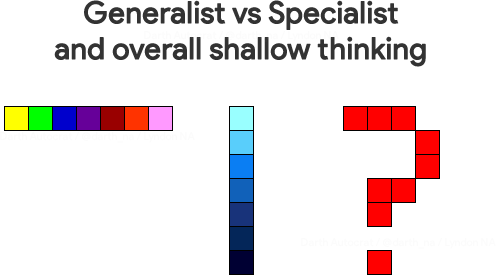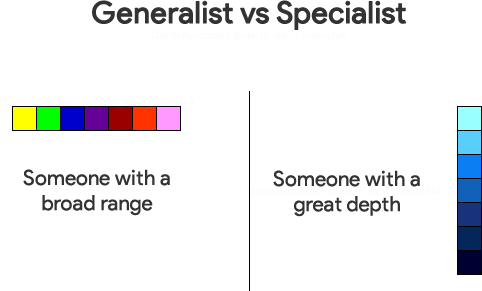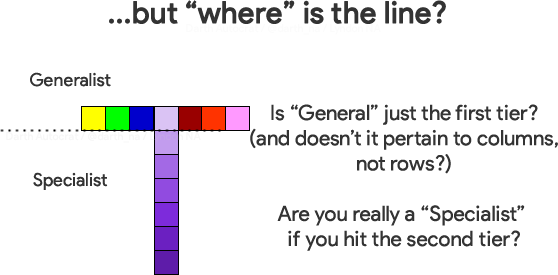
.
::: Generalist, Specialist, Stupidest... :::
I keep seeing these things pop-up,
so I thought I'd try to encourage a little thought,
discussion and hopefully improve how this topic tends to be presented.
🧵>>>
#SEO #Marketing #Skills
::: Generalist, Specialist, Stupidest... :::
I keep seeing these things pop-up,
so I thought I'd try to encourage a little thought,
discussion and hopefully improve how this topic tends to be presented.
🧵>>>
#SEO #Marketing #Skills

Generalist vs Specialist.
The typical view:
* Generalists cover multiple subjects (or sub-subjects/aspects) - they have "breadth".
* Specialists have great depth of a singular aspect.
>>>
The typical view:
* Generalists cover multiple subjects (or sub-subjects/aspects) - they have "breadth".
* Specialists have great depth of a singular aspect.
>>>

But people have realised that's not quite right!
So we end up with the "T" - both Breadth and Depth!
Wait ... it gest better!
>>>
So we end up with the "T" - both Breadth and Depth!
Wait ... it gest better!
>>>

Tada!
No - seriously - these are meant to be "things".
Alongside "T", there is also "Pi" (as in the symbol for Pi), and "M" ... because, you know, it's highly realistic to generalise in everything, apart from 3 things you specialise in!
🤦
>>>
No - seriously - these are meant to be "things".
Alongside "T", there is also "Pi" (as in the symbol for Pi), and "M" ... because, you know, it's highly realistic to generalise in everything, apart from 3 things you specialise in!
🤦
>>>

As you can guess - I'm not overly impressed with this.
For starters - where's the line?
Generalist pertains to the number of aspects (breadth), Specialist to the quality of an aspect (depth).
If you go above the basics in a topic, you are a specialist?
>>>
For starters - where's the line?
Generalist pertains to the number of aspects (breadth), Specialist to the quality of an aspect (depth).
If you go above the basics in a topic, you are a specialist?
>>>

And then there's the "multiple specialisms" ... isn't specialism singular?
If you specialise in multiple fields, you are a polymath.
So I'll make up a word - "polyist" - for multiple specialisms in related aspects :D
>>>
If you specialise in multiple fields, you are a polymath.
So I'll make up a word - "polyist" - for multiple specialisms in related aspects :D
>>>

And for me, the biggest issue is the utter lack of recognition of Knowledge vs Skill (and/or Ability).
You can know about X, but not done it, or be able to do it.
Realistically, as you progress in X, you are likely to learn a bit of W and Y!
>>>
You can know about X, but not done it, or be able to do it.
Realistically, as you progress in X, you are likely to learn a bit of W and Y!
>>>

What's more realistic are depictions of knowledge/skill that cover multiple aspects (broad),
and varying depths.
Horizontal/vertical rectangles, multiple spikes, squares, pyramids etc.
(Nothing as neat as a "T" or (FFS) "Pi")
>>>
and varying depths.
Horizontal/vertical rectangles, multiple spikes, squares, pyramids etc.
(Nothing as neat as a "T" or (FFS) "Pi")
>>>

Then we have to clear up the labels and requirements!
Specialists have to attain a minimum level of expertise in an aspect/field!
Generalists have to cover a minimum number of aspects/fields (no idea how many!), and be below a certain level (expert generalists = polyists)
>>>
Specialists have to attain a minimum level of expertise in an aspect/field!
Generalists have to cover a minimum number of aspects/fields (no idea how many!), and be below a certain level (expert generalists = polyists)
>>>

Polyists are multi-specialists - so they would need expertise (high degree of knowledge and skill) in multiple aspects.
(Polymath Polyists would have great depth in multiple aspects of multiple fields!?)
>>>
(Polymath Polyists would have great depth in multiple aspects of multiple fields!?)
>>>
Now, I'm not 100% concrete on the wording/labels.
Personally, I'm more interested in the concepts,
and moving away from shallow, linear and limited perceptions.
Being a generalist doesn't mean someone lacks knowledge/skill - it means they aren't a Specialist :D
>>>
Personally, I'm more interested in the concepts,
and moving away from shallow, linear and limited perceptions.
Being a generalist doesn't mean someone lacks knowledge/skill - it means they aren't a Specialist :D
>>>

So ... thoughts?
Does that make sense, or is it more confusing?
Do you think the "levels" make sense?
Do we like the word "polyist"?
(Bonus points if you work in a Monty python sketch :D)
Does that make sense, or is it more confusing?
Do you think the "levels" make sense?
Do we like the word "polyist"?
(Bonus points if you work in a Monty python sketch :D)
• • •
Missing some Tweet in this thread? You can try to
force a refresh





